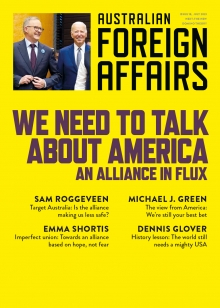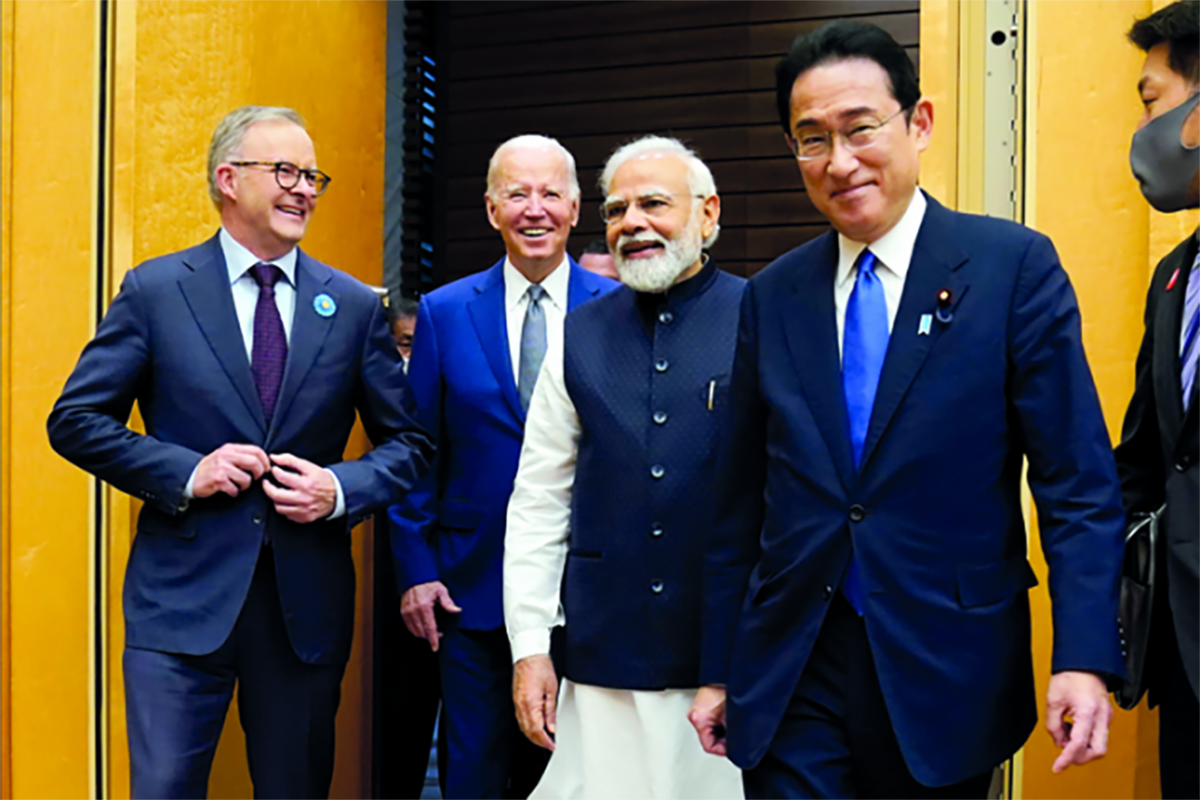
This extract is featured in Australian Foreign Affairs 18: We Need to Talk about America.
To read the full issue, log in, subscribe or buy the issue.
We sit in a rare historical moment, marked by a willingness among Australians to rethink or reshape the relationship with the United States. It is a moment that should be seized before it disappears again.
While polling consistently shows broad support for the alliance, a recent United States Study Centre study shows that there is room to move. Many Australians are hoping for the “articulation of a positive, more aspirational vision” of the relationship.
With the United States embroiled in continuing crisis, developing and articulating such a vision becomes ever more urgent. Doing so might help to ensure that the alliance (and the rest of the world) minimises the fallout from the worst-case scenarios of US democratic decline or collapse. For the current Australian government, it also offers an opportunity to seize the likely narrow window of opportunity to rethink other less extreme but no less uncomfortable realities: the ever-present risk of bad American decision-making and the violent exercise of US power in service of such decisions.
Domestically, both President Biden and Prime Minister Albanese were elected on programs of gentle progressive change, especially on cli-mate. There remains an appetite among those who elected them for a positive and aspirational approach to climate action, addressing racial and gender injustice and reducing economic inequality. They were elected, in short, on platforms of transition.
Both leaders have embarked on such programs, in their own ways. In mid-2022, Biden oversaw the passage of the Inflation Reduction Act, a mammoth piece of legislation that, despite significant flaws, is the largest and potentially most important piece of climate legislation in American history. At almost the same time, the Albanese government oversaw the passage of its own climate laws, locking in emissions- reduction targets. Both have pursued policies that are explicitly and unapologetically designed to support women through, for example, childcare reform. And both governments are acknowledging, and listening to, Indigenous voices. One of Biden’s first executive orders cancelled the Keystone XL fossil pipeline project. In both countries, for the first time in our shared histories, Indigenous women have been appointed to key ministries. At the end of 2022, Biden hosted the first in-person Tribal Nations Summit in six years. The Albanese government will, at long last, hold a referendum on the Indigenous Voice to Parliament.
From a genuinely progressive perspective, all of this is too slow and none of it is anywhere near enough. But it is, potentially, a platform on which something new might be built, and at least recognises that functioning democracies require genuine, sustained and inclusive participation. Successful transition, especially when it comes to the climate, depends on it.
The alliance, just like our domestic politics, could transition into something quite different. Arguably, it is only through such a transition – one that shifts the “capital-A Alliance” from its anti-democratic national security agenda to one based on shared progressive values – that the relationship will be built on the “positive, more aspirational vision” so many people in both places crave, for their homes and for the roles their nations play in the world.
Basing the relationship on those bonds, rather than on cold, anti- democratic assessments of security, does not mean setting security aside; far from it. It would mean understanding security differently. The domestic understanding of security that Biden and Albanese appear to share – one based on reducing environmental, racial and economic inequalities and ensuring active, sustained participation in healthy democracies – could and should apply to the international arena. The alliance and its architecture, in concert with the long list of acronyms into which the relationship has expanded, could more closely align its ambition to the domestic visions of its component national governments. Leaders of each country might attempt to unite their domestic and their international selves, and in more than just rhetoric. For the Australian government, this would mean always seeking out, encouraging and supporting the Biden who passed the IRA for the good of the American people, and not the Biden who is running a global empire. It would mean an alliance based on democratic solidarity, not on shallow and inauthentic democracy promotion. Such a relationship would understand democracy as both shared interest and shared value, and as foundational to a sustainable and peaceful future.
This reframing of international security would lead to a very different understanding of potential threats and how to mitigate them.
The foundational document of the alliance, the ANZUS Treaty, was constructed with a particular, and deeply racist, view of outside threats as constant and inevitable. A values-based approach might challenge such assumptions at the heart of the alliance, leading to a foreign and security policy that aims, always, to avoid wars rather than assuming it will be necessary to fight them.
An understanding of the history of international relations that does not centre the United States shows that this is possible. At the same time that the ANZUS Treaty was being signed, European nations that had been engaged in centuries of existential conflict were beginning a long process of integration and collaboration. Openness to such possibilities in this part of the world could lead to more proactive policy developments and a shift from an almost exclusive focus on bi- and trilateral relationships with countries far outside our neighbourhood, to genuine collaboration in and with the region. This would mean, too, greater openness to all partners operating in the region: to Pacific nations, France, the European Union and New Zealand. While Australia of course already works with these “partners”, they remain second in line behind the United States (if that wasn’t obvious before 2021, AUKUS has made it abundantly clear).
A genuine reckoning with the “capital-A Alliance”, through the lens of shared democratic values, must mean a reduction in aggressive “forward defence” acquisition. It should mean a slow, deliberate military extraction from the United States; not a total withdrawal, by any means, but small changes that might mean less “interoperability” and “interchangeability” and something less subject to the whims of the US empire. A smaller, adaptive defence force with a focus on peacebuilding and crisis response would greatly disrupt the escalation of threats encouraged by a posture of “forward defence”, and help to end the fiction of nuclear deterrence. Reduced spend on the instruments of forward defence would also free up funding for progressive programs of climate action and poverty reduction, which governments across the Pacific have recognised as critical to security. In the event of a change of government in either nation, an alliance already in the process of transition might be less subject to hijacking by anti- democratic, warmongering security interests.
None of this precludes Australia from, in the words of Australia’s foreign minister, Penny Wong, having to “deal with the world as it is”. But efforts “to shape it for the better” require radical courage, and radical hope. An alliance in transition might allow us to ask ourselves perhaps the most pressing question of all: what could we bring to the world if we weren’t so afraid?
This is a 1163-word extract of a 5,423-word essay in AFA18 – We need to talk about America







